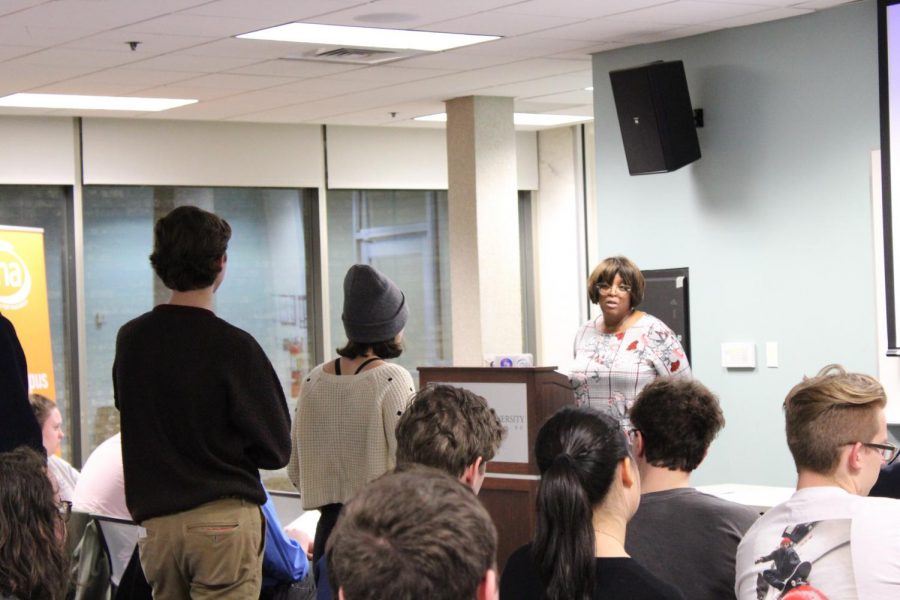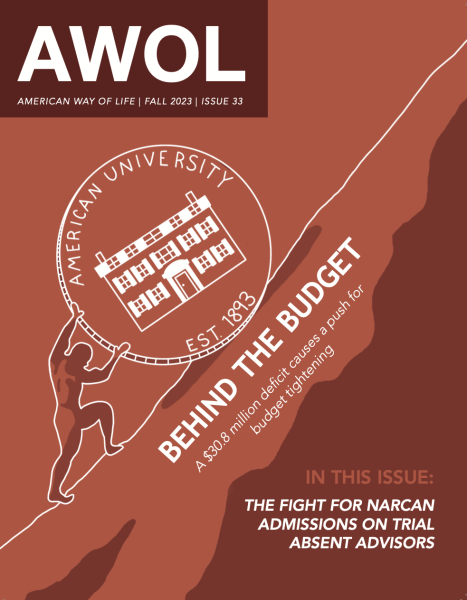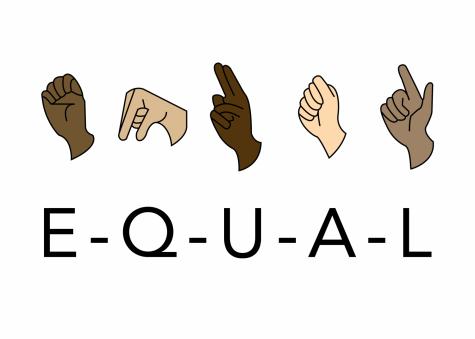Powell fails to address student concerns about Meal Plan Proposal at RHA Town Hall
Powell blames students for food quality, students plan to protest
Ann Marie Powell, the Director of Dining and Auxiliary Services for AU, faced backlash about the increased pricing of meal plans next semester during a town hall forum hosted by the AU Residence Hall Association in Letts Formal Monday night.
The proposed meal plans have received criticism from some students, most notably due to the minimum meal plan for freshman and sophomores, which costs $2,540 and limits students to only twelve meal swipes per week and 300 Eagle Bucks per semester. Twelve meal swipes per week are equivalent to less than two meals per day.
The Town Hall was live streamed on Facebook on the RHA’s profile page and allowed students to voice their concerns in person and via Facebook instant messaging.
Cross contamination, customer service, food quality – “It’s your fault.”
One of the more controversial moments of the evening was when a student with a severe allergy asked about cross-contamination in TDR, which was a significant concern due to his allergy.
“My food has been cross-contaminated at TDR twice this semester,” the male student said to Powell. “Thank God I haven’t had to go to the hospital, yet. But with this meal plan, how would you justify making someone pay more for a literal game of Russian Roulette?”
Powell, foreshadowing a trend that would continue through the Town Hall, placed the majority of the blame on the students and not the department in which she is in charge.
“I’m gonna say that, most of the cross-contamination; I’m not gonna say all of it, but most of it, I’ve seen is [because] of your fellow peers,” Powell said.
Powell said she has personally seen students move serving spoons between food stations at TDR. She then told the audience a story about a girl she claimed to have seen stealing milk.
“Actually, it was the same Sunday I presented to the Student Senate,” Powell said. “I watched a young lady go in there [TDR], and take a quart of milk, and stick it under her coat to get ready to leave.”
The student with the nut allergy stood silently for a moment and asked again how the price increase can be justified when the school cannot ensure the prevention of cross-contamination.
“We don’t serve nuts,” Powell said, raising her voice. “Basically, nothing that we make uses nuts.”
Powell then shared a TDR secret to the crowd. She said that the school substitutes everything that requires milk as an ingredient with water, to ensure the safety of lactose intolerant students.
A few moments later, a military veteran student asked Powell about customer service and the quality of food at TDR, something that has been a topic of frustration among the student body.
“I kind of feel disappointed with the customer service part,” said the student. “If you say that [Aramark workers] are trained for customer service, then how come when I ask for a slightly bigger portion, they decide to yell at me?”
Powell again placed the majority of the blame for poor customer service on the students, not the workers.
“Let’s be real,” Powell said. “I’m gonna be real with you. We do have some employees that we have to work a little bit harder on customer service; being nice, ok? Just, like, I’m gonna be real and say, there are some students that need to work a little bit harder at being on the other side, of being nice to the person standing in front of them. It’s a two-way street.”
Powell then explained that Aramark workers are trained in customer service and that she is personally working with workers to improve their demeanor.
Powell’s response garnered backlash from the comments section of the Facebook live stream.
“It is a two-way street, but only one pays thousands of dollars,” Jack Mason commented.
The veteran then asked a follow-up question about the quality of food on campus.
“I think it’s atrocious that the food I used to eat in basic training in the military is better than TDR, something that I pay thousands of dollars [for in a meal plan],” the student said.
Powell blamed the student body’s “taste palate” for their inability to enjoy the food on campus.
“Everyone has a different taste palate, ok?” Powell said. “Everyone has something different that they are looking for. So, if your food is not good and is not cooked, you need to work with me.”
The student, upset with Powell’s answer, repeated his question, this time being more specific.
“So, here’s the thing,” he said. “I thought the MRE was bad when I was eating at the [military] field, but now I feel like whenever I go to TDR, the food is dry, it’s rotten, and I feel like — at least the MRE’s aren’t rotten.”
The student is referring to “Meals Ready to Eat,” also known as “MRE,” which is a US military precooked ration pack, according to Collins dictionary.
At this point, Powell approached the student angrily while waving her hands in the air.
“So give me examples!” Powell said in an escalated tone. “Give me examples!.”
Although the mediators encouraged the student to hand the mic over to give someone else the opportunity to ask a question, Sophomore Lawrence Oberemok messaged AWOL via text message and gave an example and a video of a time when he received subpar food.
“Well, I went to Elevation Burger second semester of freshman year with my roommate Jack Quinn,” Oberemok wrote. “I ordered my burger, and after over 30 minutes of waiting, I get my food. I head back to the lounge and open it up, but it wasn’t what I ordered.”
Oberemok explained that he had ordered a burger with some toppings, but he could not remember which specific toppings. Upon opening his brown Elevation Burger bag, he made a bizarre find.
“The burger had nothing on it except the meat and buns,” Oberemok said. “So I start eating my French fries, and while I’m eating, I pull out half a [uncut] potato that was also fried and was covered in salt.”
Student Media and Powell
Not only was food and customer service a topic of concern among students, so was the treatment of student media by Powell.
Powell became defensive when Freshman Sarah Gordon asked a question about an AWOL editorial published last week about the removal of Noah Vehafric, a staff writer, from a public Dining Advisory Board meeting on January 30.
“I just want to know what your reasoning was [for removing Vehafric]?,” Gordon said. “AWOL and The Eagle are great outlets for students to be informed”
Powell responded by saying that for student media to report on Dining Advisory Board meetings, everyone at the meeting must agree to go on the record, and that was the reason for asking Vehafric to leave.
“You can come here as a student, but to represent a paper, I need to get the buy-in from all the people sitting at the table,” Powell said. “That they know they’re being recorded of what they’re saying. That was my statement, that was the statement to him,” Powell said, wagging her finger at the student who asked the question.
AWOL stands by Vehafric’s version of the story. He says he was asked to leave after identifying himself as student media, a story collaborated by AUSG senators Wayne Rodriguez and Robert Zitzmann.
“At the advisory board meeting, I remember her [Powell] saying that she would like questions in advance over email so that nothing can be misinterpreted,” Zitzmann said in an email to AWOL. “At the RHA meeting, she said that her hesitation was grounded in a desire to make sure all of the students at the meeting were comfortable being put on the record.”
RA’s and Meal Plans
Other students, such as sophomore Victoria Vena, believe the timing of the meal plan increase is interesting and might be correlated with other university policy changes – specifically, the school’s plan of allowing current freshman to apply to be resident assistants next year.
Vena said to AWOL via Facebook Messenger that the decision to allow freshmen the ability to apply to be RAs next year has made an already competitive application process even more “cut-throat.”
“I have wanted and needed due to financial reasons, to be an RA since I started at AU,” Vena told AWOL. “I started working for Hall and Residence Life freshman year and have dedicated so much time to the department in hopes of getting an RA job.”
Although Vena says she has been a hard-working employee and worked long shifts as a desk receptionist, she was not offered an interview.
“It seems extremely suspicious to me that the same year they allow sophomores to become RAs is the same year they increase the cost of the meal plan by a ridiculous amount, effectively forcing these sophomore RAs into paying what little money they would’ve made from the job for a meal plan,” Vena said.
Students Take Action
Powell’s answers in the Town Hall last night, or lack thereof, has forced students to organize and protest. One of these students is junior Mitchell Lenneville.
Lenneville has planned a protest called “AU Protest: Food & Tuition Increase” and the event, which has been active since the early hours of Feb. 12, has already received interest from over 400 students and RSVP’s from 141 students on Facebook.
“My hope is to have 500 people in attendance,” Lenneville said. “My team of 30, a team that is growing, has been planning this for a month or so.”
The protest will feature a Pre-Protest Town Hall on February 24 in Kerwin 1 at 8 pm. The protest against AU’s Board of Trustees will occur on February 28 at 10:00 am in front of the Bender Library.
Powell responded to AWOL’s request for comment via email but did not reply in time for an interview.
“As stated at the meeting, the meal plan discussed was a proposal,” Powell said in an email to AWOL. “The presentation to the Undergraduate Senators, Community, and RHA meeting was to present the proposal and obtain feedback. I have heard the feedback that the weekly meal and price is not a desired or supported option for students,” Powell said.
Although Powell said that she is aware that the plan is unpopular among students, it is unclear as to whether she will change the proposal.

As a sophomore majoring in CLEG and Journalism, I was drawn to journalism because of the fact that you can make a difference with the stroke of a pen....












